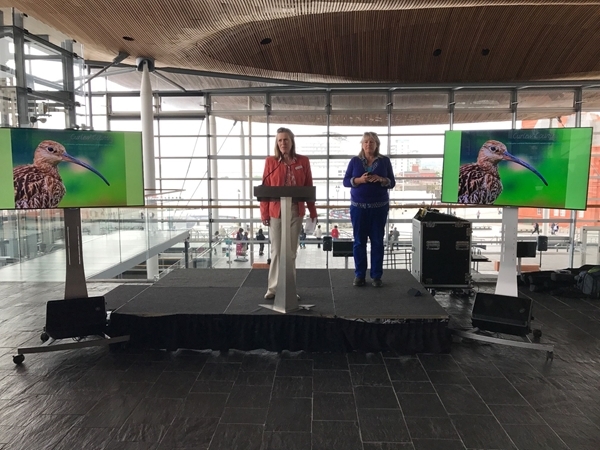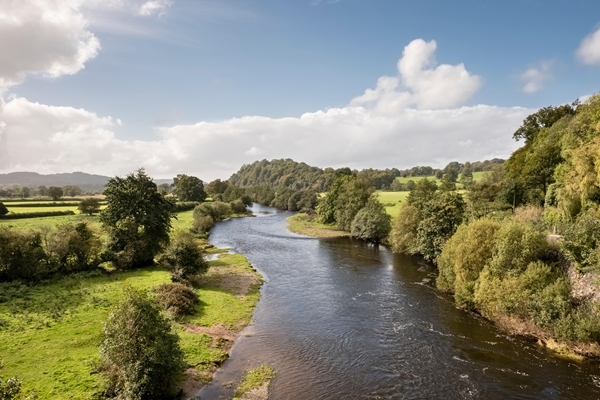
A RALLYING cry to halt shocking wildlife declines in the countryside was made to members of the Welsh Assembly from conservationists at the Game & Wildlife Conservation Trust (GWCT) Cymru.
Several passionate speakers at the Trust emphasised to Assembly Members, researchers, and guests from other organisations how urgent action to save our threatened countryside is needed.
Dylan Roberts, head of fisheries for GWCT, spoke emotionally about the state of the rivers in Wales and regaled stories of how they looked when he was a boy which encouraged so many youngsters to fish.
He said in the 1980s and 1990s, Wales was the mecca for sea trout - sewin fishing - worth an estimated £14m every year and that the River Tywi, pictured below, supported an average rod catch of over 6,000 sewin a year, whereas since 2016, only 1,743 sewin were declared by Tywi anglers.
Salmon populations are also in a rapid rate of decline, with 21 out of 22 Welsh salmon rivers classed as ‘at risk’.
“The deterioration in our rivers is a crisis yet pollutants of the waterways don’t seem to be brought into account,” he said.
“Although there were 3,000 pollution incidents in Wales over the past 3 years with almost 20% coming from water companies, only a minor fraction was even investigated.”
“Intensive agriculture is a major problem, but I don’t blame farmers. Politicians must bite the bullet and put in place suitable policies to pay our farmers to protect the environment, current policies allow them to do the opposite but still allow them to be profitable food producers without the pressure to intensify.”
In addition, only 37% of freshwater bodies in Wales, as defined by the EU’s Water framework Directive, are classified as in good quality.

Duncan Sinclair is one of the gamekeepers on the Powys Moorland Partnership which is looking at boosting the number of ground-nesting birds by improving heather habitats through a Welsh Government/EU-funded Sustainable Management Scheme.
He said: “Our landscapes should be viewed as national heritage property that needs managing and maintaining - if they are to recover the number of declining numbers of bird species, strengthen their capacity to hold water and lock in carbon, as well as being amazing places to visit. It’s a big ask and it needs huge investment to deliver this brief effectively.”
“Gamekeepers work hundreds of hours a week for a modest pay because they care passionately about the wildlife and what it supports, but they can’t do it alone.”
Amanda Perkins from Curlew Country, a project hosted by GWCT, added an emotional plea to the day by reiterating that only 400 pairs of curlews are left in Wales – plummeting 80% in over 30 years.
“Data collected over the past three years shows that from over 30 nests monitored in two years, no chicks survived to fledge. A very bleak picture indeed. And although temporary electric fencing has been trialed and much closer collaboration with farmers has taken place, 50% of the predation recorded using cameras on nests has been down to the fox, followed by around 25% by badgers. In the race against time to save curlew, predation control is needed,” she stressed.
“It is still such a difficult subject and many funders refuse to fund it which makes the success of these projects very unlikely. We need to have these uncomfortable conversations now if the curlew is going to be around for future generations. We are running out of time.”
Wildlife artist Owen Williams, who is the founder of Woodcock Network, spoke about the impressive level of woodland habitat creation and maintenance work conducted by shoots. He cited the award-winning 30 hectares of woodland and 19 ponds created near Tregaron by The Camddwr Shooting Society that have brought significant gains in biodiversity to the area.
There were also talks at the event on June 5th from Welsh rugby legend Sir Gareth Edwards and GWCT Cymru chairman Nick Williams, who laid out his hope for the Welsh public and policy to work together to give the nation’s wonderful countryside a better future.
Notes to editors
The Game & Wildlife Conservation Trust – providing research-led conservation for a thriving countryside. The GWCT is an independent wildlife conservation charity which has carried out scientific research into Britain’s game and wildlife since the 1930s. We advise farmers and landowners on improving wildlife habitats. We employ more than 60 post-doctoral scientists and other research staff with expertise in areas such as birds, insects, mammals, farming, fish and statistics. We undertake our own research as well as projects funded by contract and grant-aid from government and private bodies.
For information, contact:
Eleanor Williams
Telephone: 07592 025476
Email: press@gwct.org.uk